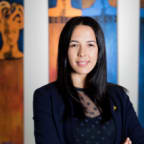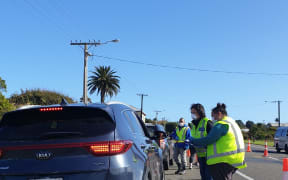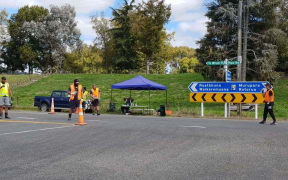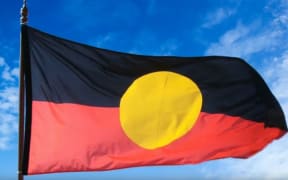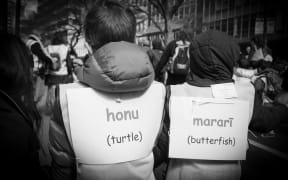Māori communities in isolated areas are turning up in droves to be tested for Covid-19.
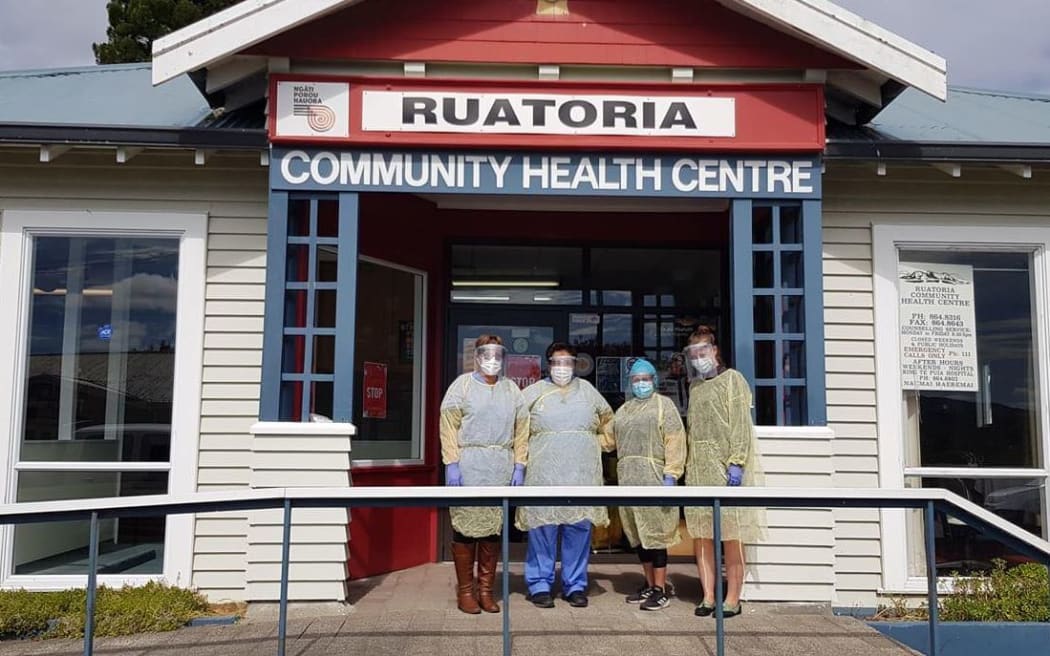
Staff at Ruatoria community health centre with the face shields made by Te Kura Kaupapa Māori o Te Waiu o Ngāti Porou. Photo: RNZ / Te Aniwa Hurihanganui
Iwi health providers are kicking off mobile testing in isolated places all over the country to increase Māori test rates.
Ngāti Porou Hauora hit a record day of testing on the East Coast on Tuesday.
Primary care manager Bobbie Cameron said lines of cars turned up to the mobile clinic in Ruatōria.
"We thought we would get a lot of people showing up and we got 160 in the end," she said.
"And that was the record across the coast!"
Ms Cameron said they have swabbed about 15 percent of the coast and all tests have come back negative.
She said whānau want to know that Covid-19 is not in their community.
Locals were even running competitions at the mobile clinics to attract people, including taking a selfie after your swab and going into the draw for a meat or food pack.
"They were like little mini competitions between areas so it became a bit of an inter-community swabbing challenge, so who could get the best numbers between areas?
"Really challenging whānau to get out there and get it done."
Ministry of Health said Māori make up 15.8 percent of nationwide tests, just shy of the Māori population rate of 16.1.
But it has not released any new data on Māori testing for almost two weeks.
The Prime Minister has called for more tests for Māori, and iwi and Māori health providers are bearing the brunt of that work.
In Taranaki, Tui Ora clinical director Bernard Leuthart said they had swabbed about 100 people at their homes this past fortnight.
He said whānau can call their 0800 number and the team will go to their house to do tests.
"Our team were able to respond to a whānau bubble which was pretty big, about 18 people across two households, close together, and symptomatic folk in that bubble," he said.
"We are getting the information back and we are seeing that testing rates in some parts of Taranaki are about double for Māori compared to non-Māori."
In Northland yesterday, nine Māori health providers were running mobile clinics in the region.
Whakawhiti Ora Pai chief executive Errol Murray said many whānau don't want to travel to big towns to get tested.
So his mobile clinic is stopping at remote places all along the tip of the Far North including Waiharara, Ngataki and Te Hapua.
"We want to ensure that it is not within our community, we need to actually allay the anxiety and the fears of our whanau," he said.
"Our history shows that when we have a look at pandemics or flu epidemics that have actually hit New Zealand.. it has not been kind to us."
In the Spanish Flu outbreak in 1918, Māori died at a rate eight times that of non-Māori.
Te Rūnanga o Whaingaroa Whānau Ora Mōhiotanga Manager Tina Ruwhiu said there is angst among whānau Māori over covid-19.
She said poverty and a lack of transport is prohibiting many whānau from going to get tested at community clinics.
Many iwi health organisations and specialists are working in new territory and setting mobile clinics up in a matter of days.
Ms Ruwhiu said iwi health services are working hard to organise the mobile clinics and programme.
"You know when the aunty rings up and says 'oi, you've got to get down to that marae'?" she said.
"We this is the same sort of situation where we pull on the skills and the capabilities of those in our communities to be able to deliver this.
"Because, at the end of the day, it is about our whānau, it is about their wellbeing, and ensuring we are getting equitable care."
In Southland, a testing clinic was held at Kāti Huirapa Rūnaka ki Puketeraki Marae in Karitane on Wednesday, where 37 people were tested.
The region has had high rates of positive tests for Māori but WellSouth medical director Dr Stephen Graham said that's an indication that not enough tests are being done.
He said they had made gains in this area since the last statistics were released on April 18.
And more testing will be conducted at two marae next week where they are aiming to test 160 people in total.
"We are certainly very keen to target that group," he said.
"It is about equity but it is not just about equity. It is also about looking at a group where this disease could be hiding and we want to make sure it is not hiding there.
"It is a genuine attempt to help all of society by helping Māori."
A number of the mobile units are also testing people without symptoms.
It's hoped this approach will give assurances that Covid-19 is not spreading undetected among us.
